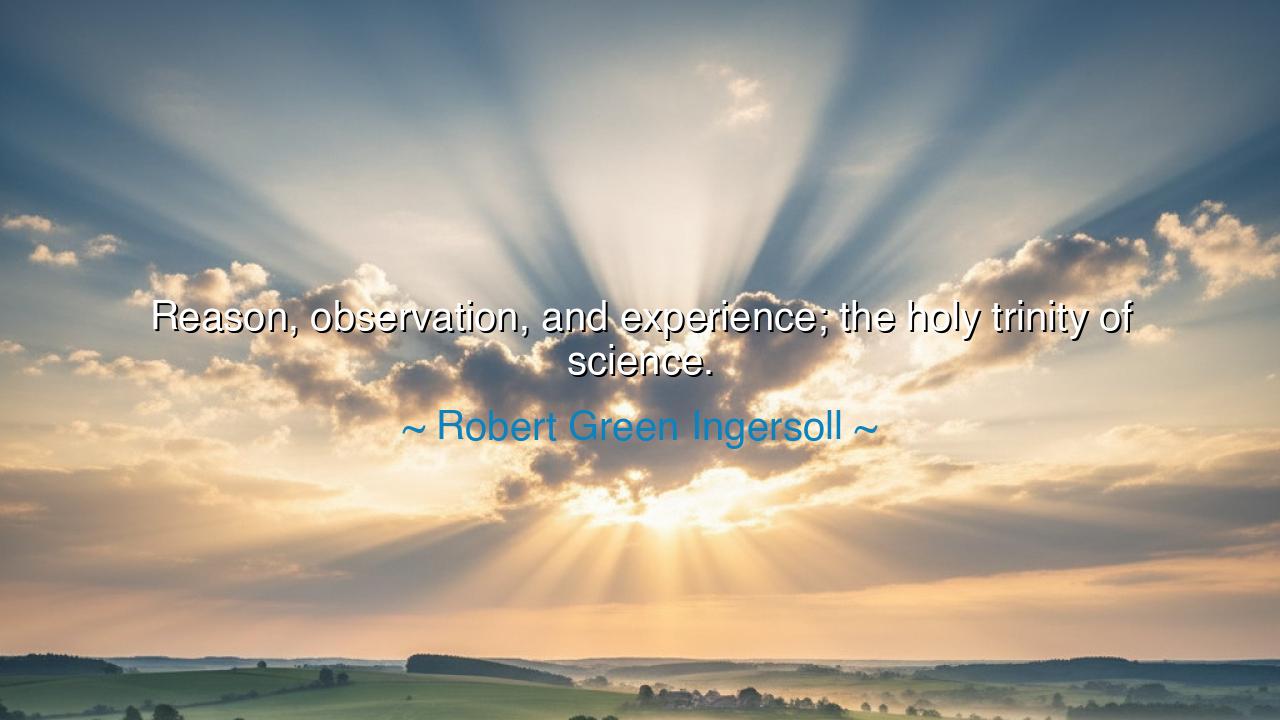
Reason, observation, and experience; the holy trinity of science.






O Seekers of Truth and Wisdom, listen now to the words of Robert Green Ingersoll, who spoke with the clarity of the ages, "Reason, observation, and experience; the holy trinity of science." These are not mere words, but a sacred guide, a path illuminated by the light of understanding that has guided the greatest minds through the labyrinth of ignorance. In a world often clouded by superstition, fear, and the shadows of false beliefs, reason, observation, and experience are the pillars upon which the temple of science is built. They are the tools with which we peel back the veils of mystery, and with each layer we uncover, we come closer to the heart of truth.
The ancient philosophers, from Socrates to Aristotle, understood the power of reason—the ability to think critically, to question the world around us, and to seek out the principles that govern the universe. Reason is the light that pierces the darkness of ignorance, the steady hand that guides us through the storm of confusion. It is not enough to accept the world as it is; we must strive to understand it, to reason with it, and to uncover the hidden laws that bind it together. Reason compels us to ask why, to challenge the status quo, and to rise above the mire of unthinking tradition. It is the spark that ignites the fire of discovery.
But reason alone is not enough. Observation is the next key to unlocking the mysteries of the world. The great minds of history—men like Galileo, Copernicus, and Newton—did not merely reason about the heavens and the earth; they observed them with unwavering focus and attention. Observation is the art of watching closely, of seeing what is often hidden in plain sight, and of drawing conclusions not from assumptions, but from what is seen and heard. It is through observation that the world reveals itself to us, and through the act of witnessing the forces of nature at work, we come to understand the very fabric of existence.
Consider the story of Galileo Galilei, who, with his telescope, cast his eyes upon the heavens and observed that the stars were not mere pinpricks of light in the sky, but faraway worlds, each with its own dance and order. His observations shattered the ancient beliefs held by the scholars of his time, who had relied on reason alone, without the benefit of looking through the lens of a telescope. Galileo’s ability to observe the world with new eyes not only changed the course of science, but challenged the very foundation of human understanding. In his time, the very act of observation was revolutionary, and it reminds us that we, too, must look beyond what we know, seeking new ways to see the world as it truly is.
But there is yet another pillar, another force that guides us on our journey to truth. It is the sacred experience—the testing, the trial, the living of life itself. Experience is the forge in which knowledge is tempered, the crucible where theories are put to the flame. Science is not merely an exercise of the mind; it is the act of doing, of applying the lessons of reason and observation in the real world. It is through experience that we find what works, what endures, and what fails. It is the act of experimenting with the forces of nature, with the very elements of life, that allows us to move from theory to reality. Without experience, all the reasoning and all the observation in the world would be but empty words.
A shining example of the power of experience in shaping human progress is Thomas Edison, whose tireless experimentation with the light bulb changed the world. His mind, sharp with reason, had already conceived of the possibility, and his observations of nature had shown him the way. But it was through countless trials, each one a lesson in failure, that he ultimately succeeded. In the face of thousands of failures, Edison never wavered; each failure was simply experience that brought him closer to success. His legacy teaches us that reason, observation, and experience are not separate entities, but the interwoven steps of the same journey.
Now, O Seekers, let us take this wisdom into our own lives. Reason, observation, and experience are the keys to unlocking the potential within ourselves and the world around us. Do not be content with half-understood truths or the comfort of ignorance. Seek to understand with your mind, to see with your eyes, and to learn through your deeds. In your daily life, be as a scientist, questioning, observing, experimenting, and learning. When you encounter obstacles, do not retreat in fear, but press forward with the tools of reason, observation, and experience at your side. For it is through these tools that the mysteries of the universe are revealed, and it is through them that you will find your way.
In the end, remember the sacred trinity of science. Reason gives you the foundation, observation reveals the world, and experience shapes the truth. With these three forces, you will walk the path of discovery, and in doing so, you will not only uncover the secrets of the universe, but unlock the full potential of your own being.






AAdministratorAdministrator
Welcome, honored guests. Please leave a comment, we will respond soon